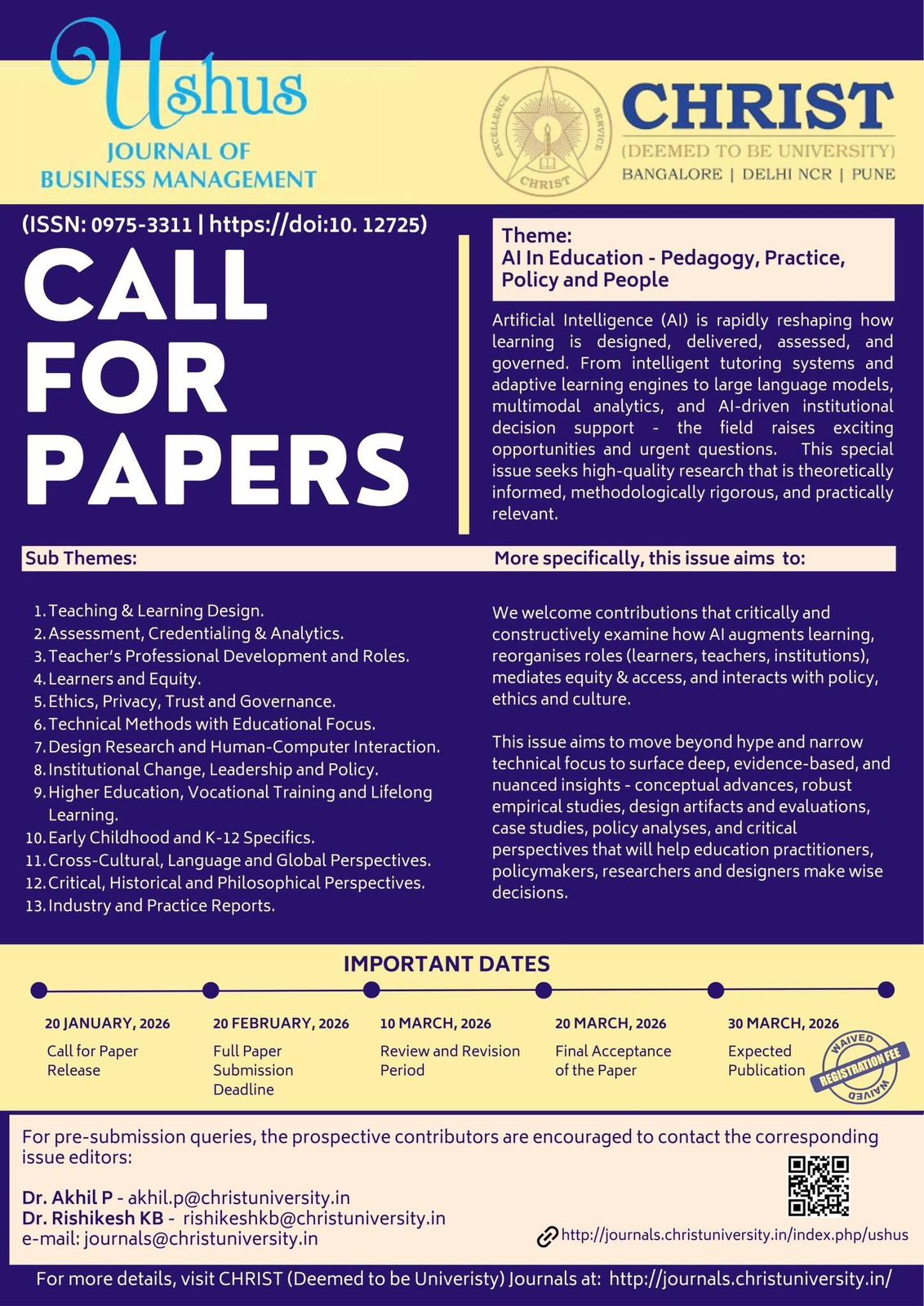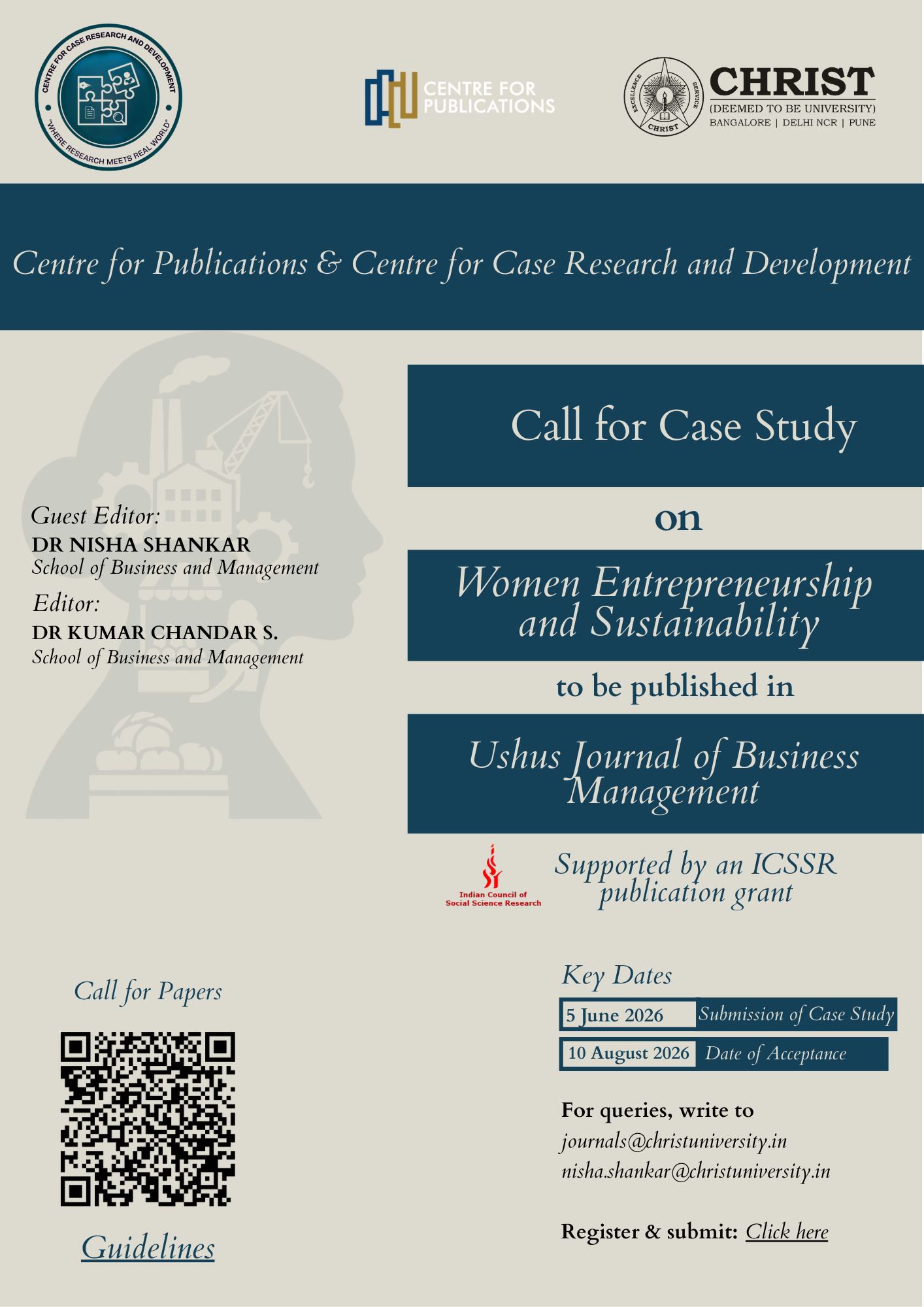An Empirical Analysis of Training Facilities in Micro-Small-Medium Enterprises (MSME) for Self-Help Groups (SHG)
DOI:
https://doi.org/10.12725/ujbm.47.2Keywords:
Micro-Small-Medium Enterprises, Self-Help Group, Development Oriented SkillsAbstract
The article presents the findings from the study on the training facilities in Micro-Small-Medium Enterprises (MSME) for Self-Help Groups (SHG) in the Union Territory of Puducherry region. The research variables were adopted in accordance to the legal provisions of SHG. Primary data of 127 random sample of MSMEs was collected through a survey method using structured questionnaire. Results show that 63% of the MSME has not undertaken any training for their suppliers, while a good proportion of the companies consisting of 15.7% have provided between 1-2 trainings. The study argues that the policy maker should identify large number of economically development-oriented skills and include them in training programmes to encourage increased development of microenterprises.
References
Adams, D. W. (2009). Easing Poverty through thrift. Savings and Development, 73-85.
Awa, H. O., Kalu, S. E., & Awara, N. F. (2010). An empirical investigation of cultural factors and consumption patterns correlates in the south-south geopolitical zone of Nigeria. International Journal of Marketing Studies, 2(1), 185.
Basargekar, P. (2008). Economic Empowerment through microfinance: An assessment of CSR Activity run by Forbes Marshall Ltd. International Journal of Business Insights & Transformation, 2(1).
De Mel, S., McKenzie, D., & Woodruff, C. (2009). Are women more credit constrained? Experimental evidence on gender and microenterprise returns. American Economic Journal: Applied Economics, 1-32.
Doh, J. P. (2005). Offshore outsourcing: Implications for international business and strategic management theory and practice. Journal of Management Studies, 42(3), 695-704.
Ganesh Kumar, C., Murugaiyan, P., & Madanmohan, G. (2017). Agri-food supply chain management: literature review. Intelligent Information Management, 9, 68-96. Ganeshkumar, C., & Mohan, G. M. (2014). Data assumptions - checking for estimating structural equation modeling: supply chain context. Anvesha, 7(4), 1-12.
Ganeshkumar, C., & Nambirajan, T. (2013a). Supply chain management components, competitiveness and organisational performance: causal study of manufacturing firms. Asia-Pacific Journal of Management Research and Innovation, 9(4), 399-412. Ganeshkumar, C., & Nambirajan, T. (2013b). Supply chain management concerns in manufacturing industries. IUP Journal of Supply Chain Management, 10(4), 69-82.
Gebremariam, G. H., Gebremedhin, T. G., & Jackson, R. W. (2004). The role of small business in economic growth and poverty alleviation in West Virginia: An empirical analysis. Regional Research Institute, West Virginia University.
Hair, J. F., Black, W. C., Babin, B. J., Anderson, R. E., & Tatham, R. L. (2006). Multivariate data analysis (Vol. 6): Pearson Prentice Hall Upper Saddle River, NJ.
Heilman, M. E., & Chen, J. J. (2003). Entrepreneurship as a solution: The allure of self-employment for women and minorities. Human Resource Management Review, 13(2), 347-364.
Jamshi, J., & Ganeshkumar, C. (2017). Causal linkage among business analytics, supply chain performance, firm performance and competitive advantage. Parikalpana, 13(2), 29-36.
Kumar, C. G., & Mohan, G. M. (2015). Sustainable performance of Indian manufacturing firms. Global Management Review, 9(2), 29-36.
Kumar, S. (2010). SHG-Linked microcredit in Kerala-A Micro-scan of prospects and problems of Kudumbashree linked microenterprises. Macro Dynamics of Microfinance, 1, 335-342.
Mahalakshmi, M. (2010). Microfinance-A Poverty Measurement Tool of Self Help group members in the Kanyakumari district and its impact on savings and borrowings. Macro Dynamics of Microfinance, 1, 251-260.
Midgley, J. (2008). Microenterprise, global poverty and social development. International Social Work, 51(4), 467-479.
Shanmugam, B. (1991). Socio-economic development through the informal credit market. Modern Asian Studies, 25(02), 209-225.
Siddhartha, T., Nambirajan, T., & Ganeshkumar, C. (2017). Distribution Methods adopted for self-help group products: An empirical analysis. IUP Journal of Operations Management, 16(4), 25-33.
Thorp, R., Stewart, F., & Heyer, A. (2005). When and how far is group formation a route out of chronic poverty? World Development, 33(6), 907-920.
Vasanthakumari, P. (2012). Economic empowerment of women through microenterprises in India with special reference to promotional agencies. International Journal of Multidisciplinary Research, 2(1), 194-210.
Downloads
Published
How to Cite
Issue
Section
License
Copyright (c) 2019 Siddhartha Thyagarajan, Thangasamy Nambirajan, Ganeshkumar Chandirasekaran

This work is licensed under a Creative Commons Attribution-NonCommercial-NoDerivatives 4.0 International License.



